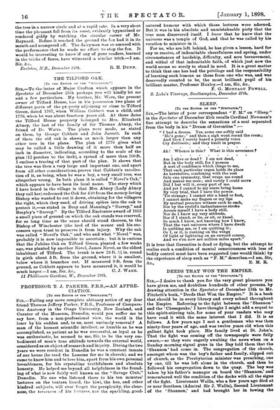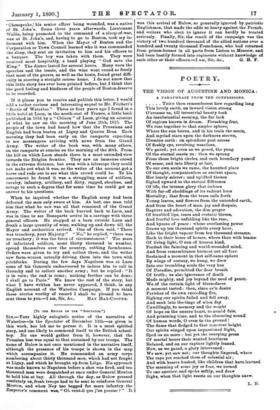DEEDS THAT WON THE EMPIRE.
[To THE EDITOR OF THE "SPECTATOR."]
Sin,—I desire to thank you for the very great pleasure you have given me, and doubtless hundreds of other persona, by drawing attention in the Spectator of December 11th to Mr. Fitchett's book, "Deeds that Won the Empire." It is a book that should be in every library and every school throughout the Empire. Referring to the fight between the 'Shannon' and the Chesapeake,' I have thought I might add a sequel to this spirit-stirring tale, for some of your readers who may have read it with the same interest that I did. It is as follows. A few years ago I met a gentleman who was then ninety-four years of age, and was twelve years old when this gallant fight took place. His family lived at St. John's. That the fight was coming off the townspeople were fully aware,—so they were eagerly awaiting the news when on a Sunday morning signal guns in the Bay told them that the 'Shannon' had come in. The congregation of the church, amongst whom was the boy's father and family, slipped out of church, as the Presbyterian minister was preaching, one by one, till he was left alone in the church, and then he followed his congregation down to the quay. The boy was taken by his father's manager on board the `Shannon,' and remembered well the condition of the decks with all the signs of the fight. Lieutenant Wallis, who a few years ago died at or near Southaea (Admiral Sir J. Wallis), Second Lieutenanb of the Shannon,' and had brought her in towing the 'Chesapeake,' his senior officer being wounded, was a native of St. John's. Some three years afterwards, Lieutenant Wallis, being promoted to the command of a sloop-of-war, was at St. John's, and, having to go to Boston, took my in- formant with him. When the Mayor of Boston and the Corporation or Town Council learned who it was commanded the sloop, they sent an invitation to him and his officers to a banquet. The boy was taken with them. They were received most hospitably, a band playing " God save the King." The dinner lasted for several hours. Many were the speeches and the toasts, and the wine went round so freely that most of the guests, as well as the hosts, found great diffi- culty in steering a straight course home. I do not know that this little story has ever been printed before, but I think that the good feeling and kindness of the people of Boston deserve to be recorded.
If it please you to receive and publish this letter, I would add a rather curious and interesting sequel to Mr. Fitchett's "Battle of Waterloo." Three or four years ago I found in a little hotel at Laon, in the north-east of France, a little book published in 1816 by a " Citizen " of Laon, giving an account of what he saw on the morning of June 20th, 1815. The people of the town had heard how that the Prussians and English had been beaten at Ligny and Quatre Bras. Each morning they had been early on the ramparts expecting to see messengers arriving with news from the Grand Army. The writer of the book was, with many others, on the ramparts at sunrise on the morning of the 20th. From the hill on which Laon stands there is a most extended view towards the Belgian frontier. They saw an immense crowd in the extreme distance, but even with a telescope they could not make out what it was, so the writer of the account got a horse and rode out to see what this crowd could be. To his amazement he found it was a struggling mass of soldiers, cavalry, infantry, artillery, and dirty, ragged, shoeless, and savage to such a degree that for some time he could get no answer to his questions.
When he inquired whether the English army bad been defeated the men only swore at him. At last, one man told him that what he saw was all that remained of the Grand Army. The writer of the book hurried back to Leon, and was in time to see Bonaparte arrive in a carriage with three general officers. He stopped at a barn outside Laon and drank a large quantity of wine, walking up and down till the Mayor and authorities arrived. One of them said, " There was treachery, your Majesty." "No," he replied, "there was no treachery ; it was the force of circumstances." The mass of infuriated soldiers, some thirty thousand in number, spread themselves over the country, robbing farmhouses. Orders were given to try and collect them, and the writer saw farm-women actually driving them into the town with pitchforks. Daring the few days Napoleon was at Laon some of his Generals endeavoured to induce him to call in Grouchy and to collect another army ; but he replied : "It is in vain; the end is come; nothing further can be done; I shall go to Paris." We know the rest of the story, but what I have written has never appeared, I think, in any English account of the Waterloo Campaign. If you think these stories worthy of record I shall be pleased to have
sent them to you.—I am, Sir, &c., HAY HAY-COOPER.
[To THZ EDITOR Or THE " SPICTATOTI."]
SzE,—Your highly eulogistic notice of the narrative of Waterloo—in the Spectator of December 11th—as given in this work, has led me to peruse it. It is a most spirited story, and one likely to commend itself to the British school- boy. No one would gather from it, however, that the Prussian loss was equal to that sustained by our troops. The name of Bulow is not once mentioned in the narrative itself, although the presence of his troops is shown in the map which accompanies it. He commanded an army corps numbering about thirty thousand men, which had not fought at Ligny, and which he brought up from Liege. His approach was made known to Napoleon before a shot was fired, and ten thousand men were despatched at once under General Mouton to hold him at bay. All through the day, as Bulow pressed resolutely on, fresh troops had to be sent to reinforce General Mouton, and when Ney too begged for more infantry the Emperor's comment was, " que j'on prenne ? " It was this arrival of Bulow, so generally ignored by patriotic Englishmen, that made the odds so heavy against the French, and writers who elect to ignore it can hardly be treated seriously. Finally, Sir, the result of the campaign was the victory of two hundred thousand of the allied nations over a hundred and twenty thousand Frenchmen, who had returned from prison-houses in all parts from Lisbon to Moscow, and had been hastily formed into regiments without knowledge of each other or their officers.-1 am, Sir, &c., G. H. F.











































 Previous page
Previous page